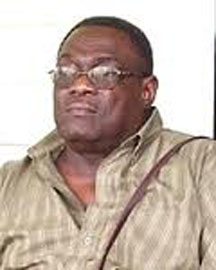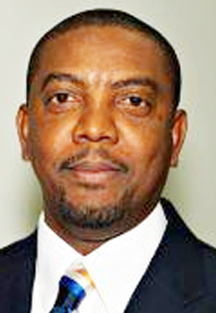The prospects for cricket in the Caribbean are now excellent following the election of Dave Cameron to the post of president of the West Indies Cricket Board (WICB) says a former WICB Director.
Claude Raphael, who also served as a member of the Guyana Cricket Board selection committee says the election of Cameron ahead of Julian Hunte was a step in the right direction.
“I think that it’s a welcome breath of fresh air that young Dave Cameron has been successful in his bid at the presidency of the West Indies Cricket Board,” says Raphael.
“I cannot say how elated I am given the poor performance of Hunte over the years and I certainly feel that with the young blood in Mr. Cameron and Mr. Nanthan (Emmanuel) you could expect real improvements in the management and administration of cricket.
“New blood always tends to invigorate and give impetus to progress and I am certainly happy to congratulate Mr. Cameron to his accession and I wish him all the best and I know he will do well. I can hardly see him doing worse”.

Raphael, speaking with Stabroek Sport in an exclusive interview at his Charlotte Street Office, said West Indies cricket under the leadership of former President Dr. Julian Hunte was on the path to destruction.

“I cannot say that I was happy with Mr. Hunte even seeking to be re-elected as president of the West Indies Cricket Board. His performance has been extremely painful and it is indeed to my mind an embarrassment to those the Barbadians and the Leeward Islands and those who supported Hunte. Particularly the Guyanese Directors who in any case don’t seem to know any better, I think that it is an embarrassment on their part that they would think about even reelecting Hunte for the presidency”.
Hunte, Raphael explained, failed to resolve the issues between the West Indies Players Association (WIPA) and the West Indies Cricket Board (WICB).
Women’s cricket despite their recent successes internationally was another sore point for Raphael.
Raphael said under Hunte’s leadership there had been no under-19 youth ladies cricket regionally and no efforts to organize ladies cricket tournaments in each domestic territory.
“So ladies cricket as it is being played now relies on those existing players with no programmes for continuity or future development of young women cricketers. I shudder to think what is going to happen when the present crop of ladies who have been doing well no doubt about that and who are extremely talented but their talents are being used and not fully exploited by proper and thorough preparation at home or in domestic tournaments. They cannot be playing only one tournament a year, that is the regional tournament and no domestic cricket in their respective countries and expect to improve their cricket,” he charged.
Raphael said during Hunte’s tenure the careers of several cricketers including that of Jamaican Chris Gayle and local lad Ramnaresh Sarwan were stalled.
Raphael also weighed in on the Sagicor training facility in Barbados, which according to him has not served its intended purpose.
“The fact that there are no Satellite Academies to fuel the centre and the serious short comings are not being addressed and th
e secretive manner in which members are selected leaves a lot to be desired. As a matter of fact the role of the academy must be clearly stated so that we can have the institution functioning as a finishing school for aspiring and potential young West Indian players as well as a rehab unit for those players who would have gone off form and found themselves needing rehabilitation”, Raphael said.
The former chairman of selectors, who personally congratulated Cameron on his win, was asked whether the topic of Guyana’s cricket was brought up. “Well I did not think that it was appropriate at that time, but I just called to wish him all the best and con
gratulate him. Certainly the Guyana situation is an issue that Mr. Cameron will have to resolve since it impacts on the unity of West Indies cricket; it impacts on what is happening in Guyana’s cricket and certainly gives a bad image of the administrative capability of the West Indies Cricket Board.
And Cameron, to my mind is obliged to address those issues in terms of getting his cricketing programme back on track for the West Indies Cricket Board.”
Asked whether he thought that Guyana’s situation played a part in Hunte being voted out, Raphael said yes.
“I certainly expect that it would have played a significant part and I think it is obvious if one were to reflect on what happened. The last time, Hunte was unopposed and I really want to extend congratulations to all of the territorial boards that suppor
ted Cameron, because it means that we are fed up with what Hunte was doing and that we are looking for a new dispensation. I think we have a change with the leadership of the young people in Mr. Cameron and Mr. Nanthan and we are giving them an opportunity. So, yes I think the Guyana Cricket Board situation must have played a role in somewhere along the line in influencing them.”
Former Guyana Cricket Board official Ronald Williams, said that the decision for the Guyana’s directors to vote for former President Dr. Julian Hunte appeared to be a hand wash hand situation.
“Hunte showed no interest in the Guyana cricket impasse because it was self-serving for him. On many occasions he failed to act on the complaints of the stakeholders of Guyana’s cricket. The only time he sent in persons to Guyana was when the Guyana Cricket Board held elections and he sent in observers in a big charade to pronounce favourably on elections held on the 28th of January. And he supported those elections and accepted the results without understanding that the elections were illegal.
“He was probably given the assurance that the Guyana delegates would vote for him. It was self-serving for him, so he accepted the illegal elections, said Williams.
Cameron won the presidency by a 7-5 vote over Hunte while his deputy Nanthan of Dominica defeated Hunte’s vice presidential candidate Joel `Big Bird’ Garner, the former West Indies fast bowler by eight votes to four.





